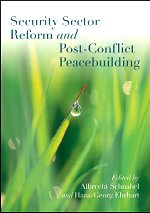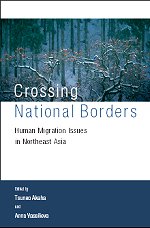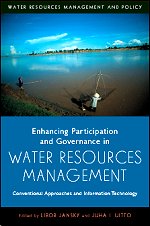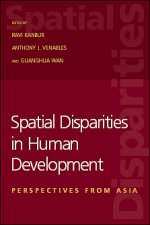ISSUE 41: MARCH-MAY 2006
network of research and training centres/programmes
FRONT PAGE | ARCHIVE |
New from UNU Press
 |
Security Sector Reform and Post-Conflict Peacebuilding
Edited by Albrecht Schnabel and Hans-Georg Ehrhart
In this book, an international group of academics and practicioners analyses experiences with security sector reform programmes in different parts of the world to provide an understanding of the complexity of addressing security sector reform and civil-military relations.
Military and police forces play a crucial role in the long-term success of political, economic and cultural rebuilding efforts in post-conflict societies. Yet, while charged with the long-term task of providing a security environment conducive to rebuilding war-torn societies, internal security structures tend to lack civilian and democratic control, internal cohesion and effectiveness, and public credibility.
They must be placed under democratic control and restructured and retrained to become an asset, not a liability, in the long-term peacebuilding process. External actors from other nations, regional organizations and the United Nations can be of assistance in this process, by creating a basic security environment, preventing remnants of armed groups from spoiling the fragile peacebuilding process, and by facilitating reform of the local security sector.
- Albrecht Schnabel is a Senior Research Fellow at swisspeace Swiss Peace Foundation, and a Lecturer at the Institute of Political Science, University of Bern.
- Hans-Georg Ehrhart is a Senior Research Fellow and Lecturer at the Institute for Peace Research and Security Policy at the University of Hamburg.
 |
Crossing National Borders: Human Migration Issues in Northeast Asia
Edited by Tsuneo Akaha and Anna Vassilieva
International migration and other types of cross-border movement of people are becoming an important part of international relations in Northeast Asia. In this pioneering study, experts on China, Japan, Korea, Mongolia and Russia examine the political, economic, social and cultural dimensions of the interaction between border-crossing individuals and host communities, highlighting the challenges that face national and local leaders in each country and suggesting needed changes in national and international policies.
The authors analyze population trends and migration patterns in each country: Chinese migration to the Russian Far East, Chinese, Koreans, and Russians in Japan, North Koreans in China, and migration issues in South Korea and Mongolia. The book introduces a wealth of empirical material and insight to both international migration studies and Northeast Asian area studies.
- Tsuneo Akaha is a Professor of International Policy Studies and Director of the Center for East Asian Studies, Monterey Institute of International Studies, California, USA.
- Anna Vassilieva is an Associate Professor and Russian Studies Program Head, Monterey Institute of International Studies, California, USA.
 |
Enhancing Participation and Governance in Water
Resources Management: Conventional Approaches
and Information Technology
Edited by Libor Jansky and Juha I. Uitto
This book aims to further global understanding of approaches and techniques for applying public participation to improve water resources management. It originates from the symposium on "Public Participation and Governance in Water Resources Management" held in Tokyo, Japan.
The United Nations estimates that more than 2 billion people in over 40 countries are negatively affected by water shortages. Increasing demand for water has been identified as one of four major factors that will threaten human and ecological health over the next generation.
Water resources management is the aggregate of policies and activities used to provide clean water to meet human needs across sectors and jurisdictions and to sustain the water-related ecological systems upon which we depend.
The International Association for Public Participation describes public participation as "any process that involves the public in problem solving or decision making and uses public input to make better decisions". Public participation aims actively to increase attention to and inclusion of the interests of those who are usually marginalized, e.g. politically disenfranchised minorities or poor people indirectly affected by water management.
In this book, the authors identify successful mechanisms, approaches and practices for promoting public involvement in water resources management, including both conventional approaches and those based on information technology.
- Libor Jansky is Senior Academic Programme Officer in the Environment and Sustainable Development Programme at the United Nations University, Tokyo, Japan.
- Juha I. Uitto is Senior Monitoring and Evaluation Coordinator at the United Nations Development Programme's Global Environment Facility Unit, New York, USA.
 |
Spatial Disparities in Human Development: Perspectives from Asia
Edited by Ravi Kanbur, Anthony J. Venables, and Guanghua Wan
Spatial inequality is a dimension of overall inequality, but it has added significance when spatial and regional divisions align with political and ethnic tensions to undermine social and political stability. This book contains a selection of papers from the UNU-WIDER conference on Spatial Disparities in Asia, held in March 2003 at UNU headquarters in Tokyo. It focuses on poverty and inequality, which are directly related to the Millennium Development Goals.
Specifically, it is a cross-country study, covering a number of countries and regions that are attracting considerable professional and political attention such as China, Russia and Central Asian countries. It addresses a wide range of issues including conflict-inequality interlinkages, poverty mapping, causes and consequences of inequality. In so doing it applies the latest research techniques such as regression-based decomposition, poverty decomposition and computable general equilibrium models.
Containing theoretical and empirical contributions by some of the most prominent economists in the area of inequality and development studies, this book will be of interest to economists, sociologists and policymakers in Asia and elsewhere.
- Ravi Kanbur is the T.H. Lee Professor of World Affairs and professor of economics at Cornell University.
- Anthony J. Venables is a professor of international economics at the London School of Economics, Director of the globalization programme at the LSE Centre for Economic Performance, and research fellow at the Centre for Economic Policy Research.
- Guanghua Wan is a senior research fellow and project director at UNU-WIDER in Helsinki.
© 2006 United Nations University